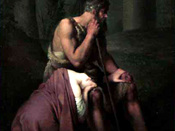In literature, as in life, justice is in the eye of the beholder. Sophocles' classic tragedy Antigone illustrates this through the story of a woman and a man who stand up for what they believe is just. Antigone takes a risk by defying Creon, the king of Thebes. She buries her brother whom Creon ruled would be denied a proper burial and left to dwell in the underworld as punishment for treason. Antigone believes that it is only just to give her brother a proper burial to pay due respect. Antigone and Creon are unrelenting in their beliefs; their hubris brings about their eventual demise. In their desire to serve what they believe to be true, their personal relationships with truth are essentially alike. The Greek concept of parrhesia, (Foucault 11) a word that is ordinarily translated into English as "free speech," embodies their beliefs. As illustrated through parrhesia, Antigone and Creon are fundamentally similar characters, seeing that they both personify this concept.
Parrhesia is a type of verbal communication where the speakers has a specific relationship to truth through frankness, a certain relationship to his or her own life through danger, a certain relationship to their self or others through criticism, i.e. self criticism or criticism of other people, and a specific relationship to moral law through freedom and duty. Parrhesia is a dialogue in which the speaker expresses his or her personal relationship to truth, and their life because he or she recognizes truth telling as a duty to improve or help other people, as well as their self. In parrhesia, the speaker uses this freedom and chooses frankness instead of persuasion, truth instead of falsehood or silence, the risk of death instead of life and security, criticism instead of flattery, and moral duty instead of self-interest...



YES SIMILAR!
Yes Antigone and Creon are similar in their stubborness and even effectiveness of what they want to decide... the point of moral rightousness or what each charcrter thinks of this idea should be further explored! .. but very good start!
5 out of 5 people found this comment useful.